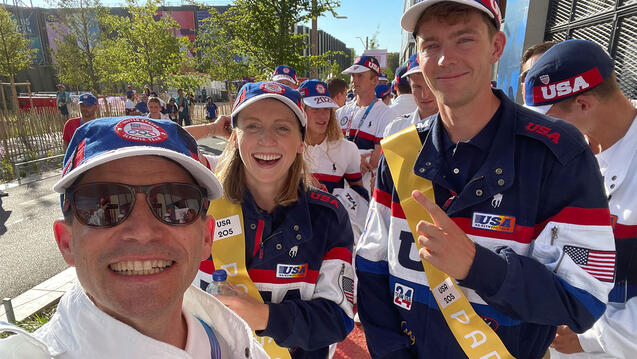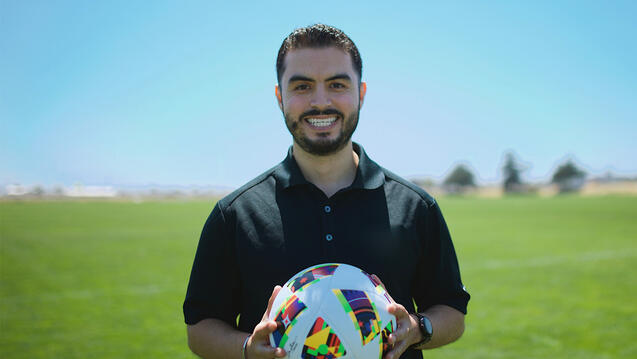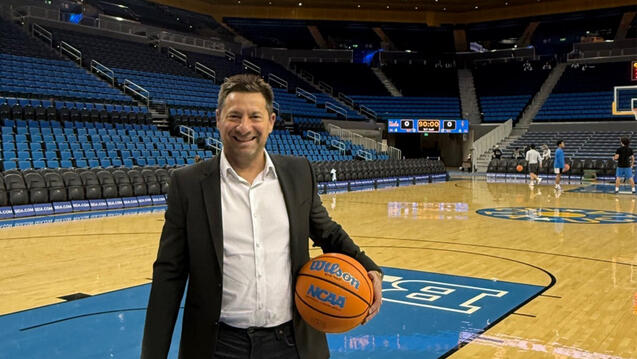
USF Sport Management Professor Awarded for Pioneering College Sports Antitrust Cases
Daniel Rascher, a sport management professor at the University of San Francisco, has been recognized nationally for his pioneering work in antitrust litigation that is changing the landscape of college sports.

Rascher, who teaches sports economics, recently received the 2024 Outstanding Antitrust Litigation Achievement in Economics award from the American Antitrust Institute (AAI) for his work on House v. National Collegiate Athletic Association. The case, which was preliminarily settled in October, paves the way for thousands of former athletes to earn a share of financial opportunities that weren’t available to them during their careers. Additionally, the settlement allows for colleges to spend an additional $20 million annually each on student athletes.
“College athletics are a big business, which is intriguing to me,” Rascher said. “And yet the whole time, they’ve been able to limit the main group of people who are generating that revenue - the college athletes - to having basically a place to sleep, food, and a scholarship. Those are awesome things to have if you’re a college athlete, but sports economists have been measuring the value of these athletes to their teams and their schools for decades and they’re super exploited. The value of some of these players, particularly basketball and football players, are well over a million dollars a year to their schools and yet their scholarships are worth maybe 80 thousand dollars, depending on tuition.
“It’s fascinating in that it looks like they have a great deal - the best scholarship on campus, a full ride - but they’re probably the most exploited people on campus, particularly the star athletes on these teams.”
With the House settlement, the NCAA is responsible for paying almost $2.8 billion in back damages to former athletes from 2016 on. Damages are allocated into three categories – broadcast name, image, and likeness (NIL), video game NIL, and lost NIL opportunities. Rascher estimated the damages for each category and helped determine how much individual athletes can receive. He also helped to certify the different classes that were approved by the court.
Rascher’s involvement with the House case is just the latest work on antitrust litigation related to college sports. He also contributed to two groundbreaking cases, O’Bannon v. NCAA and Alston v. NCAA, which reached the U.S. Supreme Court. In both those cases, Rascher consulted on the economics of the issues at hand and served as an expert witness for the plaintiffs at trial.
In the O’Bannon case, a former UCLA basketball player led the class-action lawsuit against the NCAA. The case focused on the allegation that the NCAA violated antitrust laws by preventing college athletes from profiting from the commercial use of their NIL. The judge’s decision in the case favored the plaintiffs and paved the way for changes in how college athletes’ NIL could be used and compensated.
The Alston case also focused on the NCAA’s rules surrounding compensation for athletes, specifically restrictions placed on education-related benefits. The case argued that the NCAA’s limitations on these benefits were anticompetitive. The Supreme Court ruled unanimously in upholding the lower court’s decision that the NCAA rules violated antitrust laws.
Widely recognized as an expert on NCAA antitrust cases, Rascher didn’t initially set out to focus on college athletics. In fact, he hadn’t thought of college athletics through an antitrust lens until a business partner of his watched a college bowl game one weekend and talked with Rascher about it the following Monday.
The partner, who had grown up in Canada and didn’t know much about American college sports, asked Rascher how much the athletes were paid. Rascher replied that they of course weren’t paid because they were amateurs. He didn’t think much of that, but his partner pointed out how odd that was given the salaries the coaches received. The wheels began to turn and, along with another colleague, Andy Schwarz (whom Rascher has worked with on these cases) they wrote articles, established a framework for examining college sports in an antitrust framework, and began looking for interested attorneys.
It took several years of work behind the scenes in the early 2000s, but Rascher and his business partners were hired to work on a small NCAA case and, eventually, the O’Bannon and subsequent cases.
Since those early days, Rascher has seen not only the landscape of college athletics shift, but he’s also noticed a change in popular opinion.
“When I first started teaching in the late 1990s, I would talk about this in my business of sport classes and every student sort of thought I was crazy,” Rascher said. “They thought there’s no way college athletes could be paid or should be paid. Every year, a few more hands would go up to say OK, I can see them getting paid. Now, it’s a rare hand that goes up that thinks these athletes shouldn’t get paid. It's a complete 180.”
He’s even had students in his classes who were former student athletes and received payments from the cases he’s worked on. And a former sport management student, Colin Weaver (‘16), is part of Rascher’s team that worked on the House case and received the AAI award. The award is given based on contribution to the development of antitrust-related economic methodology and presentation, and the positive development of antitrust policy.
Rascher sees his work on the House case and the previous cases as connecting well with USF’s service-oriented mission. Many college athletes, particularly in football and basketball, come from lower socioeconomic backgrounds, yet the money generated by their athletic performance was previously only going toward coaches and construction companies to build new training facilities, he said.
“I always wondered why is this money going to sort of well-off folks and it’s coming from these athletes who don’t always have much money in their pockets yet they’re the ones super valuable to their schools,” Rascher said. “It was going the wrong way.”


